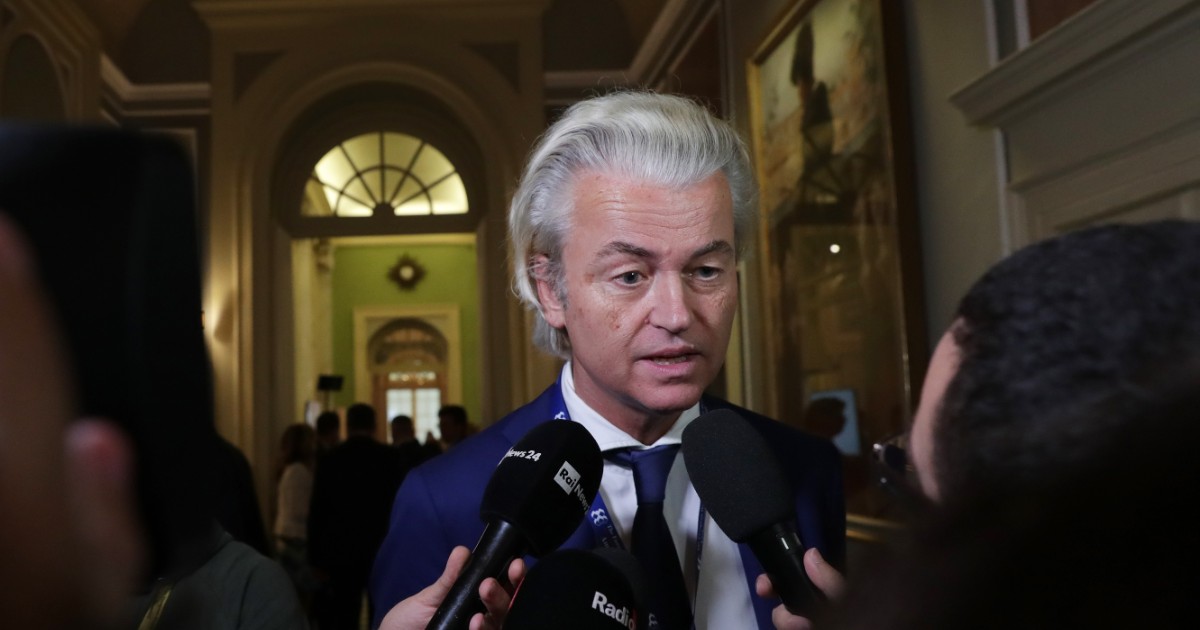Geert Wildersleader of the Freedom Party (PVV) and winner of last November’s parliamentary elections, has made it known that he is ready to give up the job of prime minister to facilitate the formation of a right-wing government. “I can only become prime minister if all the parties in the coalition support me. This was not the case,” Wilders wrote in X, reiterating his desire to form “a right-wing government”.
The Netherlands is in the grip of a serious political paralysis which, almost four months after the vote, has made the formation of a coalition impossible new executive and prolonged the mandate of the government led by the everlasting Mark Rutte. The PVV had come first in the elections with just over 23 percent of the vote and 37 seats out of 150 in the Lower House but the proportional electoral system, a political framework very fragmented (just think that the alliance between the Social Democrats and the Greens came in second place with just over 15.7 percent of the votes) and various extreme positions of the PVV have complicated the birth of the new executive.
In the Netherlands tradition has it that it is the winning party of the consultations, even if far from the majority of seats, to lead the government and the PVV has turned its gaze to the other conservative formations. The Party of Freedom and Democracyequipped with 24 seats and led for years by Rutte, the New Social Contractcentrist formation led by the charismatic Pieter Omtzigt with 20 seats and the Peasant-Farmers’ Movementdeployed on positions anti-environmentalists with 7 seats. Negotiations between the parties continued for weeks but did not produce concrete results and collapsed when Omtzigt withdrew from the table finalizing the negotiations, as reported by France24, “finished”. The NSC seemed to exclude the possibility of participating in a majority cabinet with Wilders but was open “to constructive support for a minority cabinet”. Omtzigt apparently became enraged after Wilders’ promise to find them 17 billion euros without reducing public spending but by cutting taxes.
However, efforts to form a government are not over and, according to anonymous sources heard by Netherlands Timesin the last few days the four parties have found an agreement in principle to favor the birth of a Extra-parliamentary cabinet which would be committed to achieving generic objectives and would not require a detailed agreement. This type of government, which could see the participation of technicians, would put less pressure on deputies but would still require agreements on issues such as public financesimmigration and foreign policy. What is certain, as reported by Telegraphis that none of the four leaders of the parties involved in the negotiations will have a ministerial role and that the same Wilders will not lead the executive. The political figure of the latter can be considered as the cumbersome elephant in the room that has caused more than a few problems.
The political agenda of the far-right demagogue, as reported by France24, is full of controversial positions. The PVV electoral manifesto proposed “one more restrictive migration policy”, “a freeze on asylum” and the loss of residence permits for those refugees “who go on holiday in their country of origin”. It is reiterated “the no to Islamic schoolsKorans and mosques” , the desire for “the Netherlands to have control of its own currency and borders” and for “a A binding reference was made”. A program then inadmissible for many but the subject of a partial softening in view of the vote.
An agreement with Wilders will still have to be found one way or another because a new appeal to the polls would only strengthen his positions. A survey, carried out by Ipsos between 23 and 26 February, highlighted how the PVV’s consensus reached 31.1 percent while the Party of Freedom and Democracy since the New Social Contract they have lost votes (the latter have almost halved) and the progressives find themselves in a state of stagnation. A failure in the negotiations would only strengthen Wilders and his agenda with even more worrying consequences for the Netherlands and some of the aspiring members of the government.
